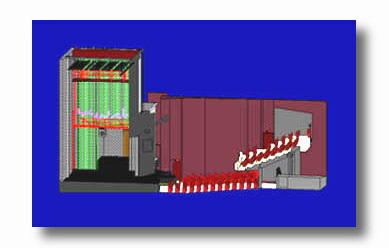 |
Home | Curriculum | Faculty & Staff | Gallery | Facilities | Shows | Tickets | Links
Facilities >> The Harvey Powers Theatre
| Welcome to Harvey Powers Theatre, the brainchild of its namesake,
Harvey Powers jr. Originally constructed in 1959, and dedicated to Powers
in 1997, the space boasts some of the best facilities and technology in
academic theatre anywhere in the country. The house has 483 seats on two
levels. The stage has a 32 foot proscenium and a depth of 27 feet. It has
a 50 foot high, 31 line-set fly house. It has an extensive cat walk system
that leads to each of three front-of -house lighting beams. The stage has
a Wagnerian orchestra pit and center stage trap as well as a new floor,
and marley for dance performances. Both the stage and the house have been
designed for maximum acoustical quality with curved oak walls, and sound
diffraction drums on the balcony, both to decrease slap-back. |

|
 |
The control booth houses one of the most sophisticated
lighting and sound systems available. The lighting control console, an Electronic
Theatre Controls Obsession, controls 380 sensor dimmers through a digital
language (DMX) as well as moving lights, atmospheric effects, and scenery
automation. Our sound system utilizes a 24 channel sound board, connected
to which are CD, cassette, reel-to-reel, and DAT players and recorders,
as well as a sampler, and an eight track digital audio workstation. Almost
all of the sound editing done in the Harvey Powers Theatre is digital, and
shows are usually burned on CDs rather than recorded on reel to reel. Sound
played through the theatre is powered by over of 5000 watts of amplifiers
connected to speakers in the front, sides and rear of the house and stage.
These speakers and amplifiers are of a high enough quality that they are
capable of reproducing the complete range of human hearing as well as THX
sound. Our sound system is also run through several equalizers, compressor/limiters
and delay units, creating time aligned sound for every audience member.
In addition to the many individual bells and whistles of the sound and lighting
system, the two are joined together through a MIDI to SMPTE converter such
that the sound system (which speaks the digital language, MIDI) can actually
control the lighting system (which speaks SMPTE) and tell the light board
when to fire it's cues. Therefore, shows may be produced in which the "Play"
button for the sound is pushed once at the beginning of the show and then
neither it nor the light board must be touched again until the show's completion.
|
In the stage right wing exists an electrics shop used for
repairing damaged electrical equipment and storing electrical accessories,
and on the stage left side, a paint shop where all the scenic painting supplies
are stored. Also in the wings is an entire wall of lighting racks which
hold over 250 ETC, Altman and Strand lighting units. Outside of the stage
itself, the Harvey Powers Theatre houses the scene shop, a 1800 square foot
space containing almost every tool a carpenter could want. Also backstage
are professor's offices, the green room, dressing rooms, and the design
studio. This studio houses eight 300 MHz Power Macintosh 9600s, as well
as a 17 x 22 inch photo-quality color printer, a flatbed scanner, a slide
scanner, and a data and video projector, all of which are available for
student use. The lab is also used for traditional drafting, model making,
and scenic and costume design.
View a Floor Plan or a Center Line Section of the Powers Theatre
Need more drawings? Go to Powers Tech Page.
Home | Curriculum | Faculty & Staff | Gallery | Facilities | Shows | Tickets | Links
|

